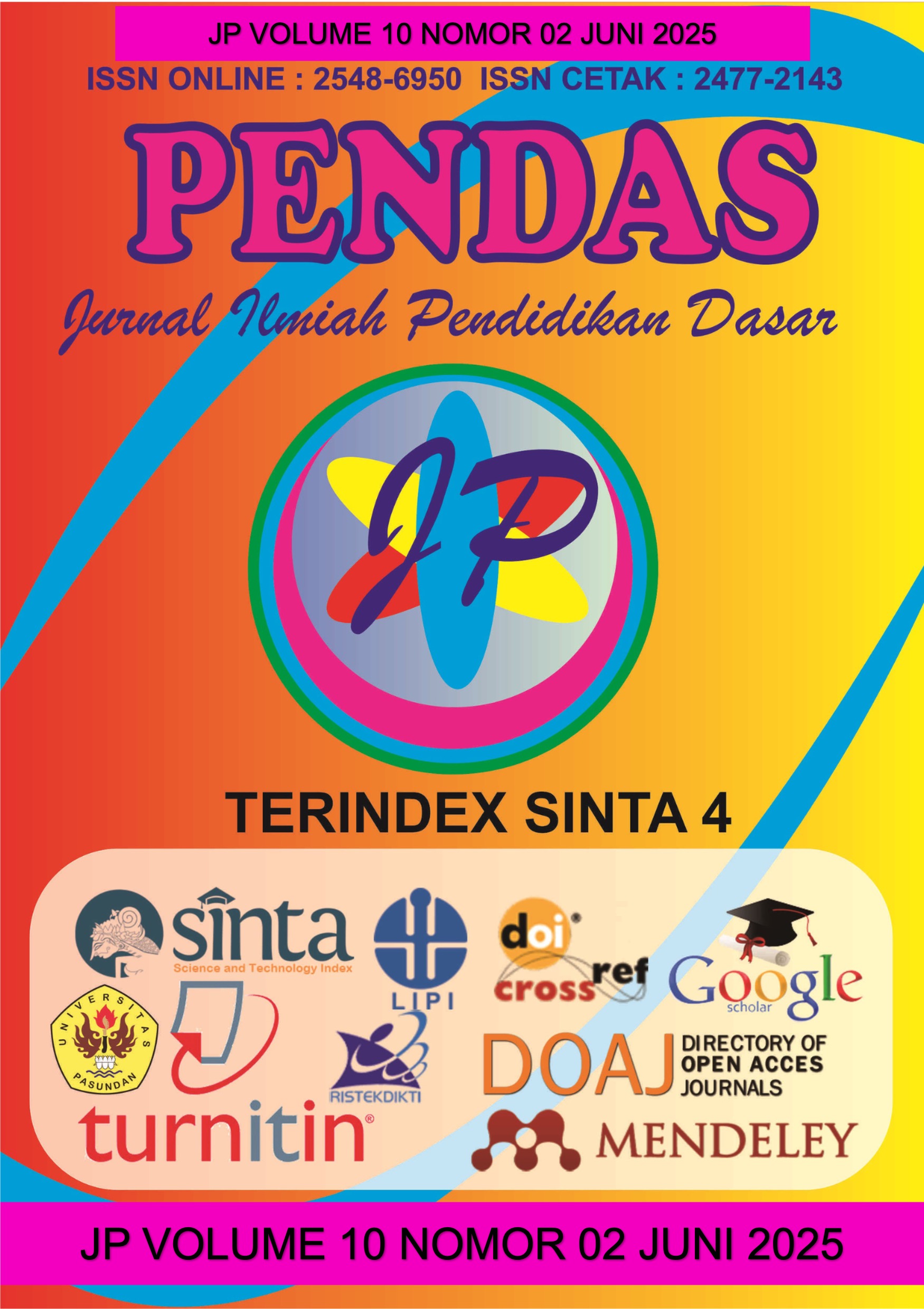INOVASI KURIKULUM PEMBELAJARAN IPAS BERBASIS PROYEK TERINTEGRASI CULTURALLY RESPONSIVE TEACHING UNTUK SISWA SEKOLAH DASAR
DOI:
https://doi.org/10.23969/jp.v10i02.24045Keywords:
IPAS, project-based learning, Culturally Responsive Teaching, curriculum, Elementary SchoolAbstract
IPAS (Science and Social Studies) learning in elementary schools still faces challenges, including low student engagement and a lack of integration of local cultural values in learning. This study aims to develop a project-based IPAS learning device integrated with Culturally Responsive Teaching (CRT) for fifth-grade elementary school students in Makassar City. The study employed the 4D development model (Define, Design, Develop, Disseminate), which includes needs analysis, instructional design, product development, and limited trials. The trial was conducted in two elementary schools, involving two teachers and 62 students. Data were collected through learning activity observations, expert validation (material and media), student and teacher questionnaires, and learning outcome tests. Validation by two material experts and two media experts showed the product to be in the "highly valid" category. Observation results indicated strong student engagement (88%), especially in group discussions and project presentations. Student responses revealed high enthusiasm for the culturally contextual and enjoyable learning process. Teachers stated that the learning device was easy to use, systematic, and relevant to students' real-life experiences. Test results showed an increase in average scores from 61.9 (pre-test) to 85.5 (post-test), with a gain score of 0.61 (high category). The project-based learning integrated with CRT effectively enhanced students’ engagement and understanding of IPAS concepts linked to local culture. This learning device is recommended for implementation in multicultural elementary school contexts.
Downloads
References
Anwar, R., & Latif, I. (2022). Implementasi model pembelajaran proyek berbasis budaya lokal dalam meningkatkan kompetensi sosial siswa. Jurnal Pendidikan Multikultural Indonesia, 6(1), 45–58. https://doi.org/10.31004/jpmi.v6i1.312
Anyichie, A. C., Godwin, C., & Ogbonna, F. (2023). Fostering student engagement through culturally responsive self-regulated learning practices. Journal of Education and Practice, 14(3), 55–64. https://doi.org/10.7176/JEP/14-3-06
Darling-Hammond, L., Flook, L., Cook-Harvey, C., Barron, B., & Osher, D. (2017). Educating the whole child: Improving school climate to support student success. Learning Policy Institute.
Fatimah, D., & Isnaini, R. (2022). Project-based learning to improve students’ environmental awareness. Journal of Primary Education, 11(2), 100–108. https://doi.org/10.15294/jpe.v11i2.55789
Gay, G. (2018). Culturally responsive teaching: Theory, research, and practice (3rd ed.). Teachers College Press.
Grossman, P., Loeb, S., Cohen, J., & Wyckoff, J. (2019). Measuring instructional practice in middle school English language arts: A comparison of approaches. American Educational Research Journal, 56(6), 2229–2267. https://doi.org/10.3102/0002831219847961
Hartati, T., & Mahardika, R. (2021). Cultural-based project learning model for elementary students in multicultural classrooms. International Journal of Educational Research Review, 6(4), 501–510. https://doi.org/10.24331/ijere.924965
Kemendikbudristek. (2022a). Panduan pembelajaran Kurikulum Merdeka. Direktorat Jenderal PAUD, Pendidikan Dasar dan Menengah.
Kemendikbudristek. (2022b). Profil Pelajar Pancasila: Kerangka operasional. Pusat Kurikulum dan Perbukuan.
Krajcik, J. S., & Shin, N. (2021). Project-based learning. In R. E. Mayer & P. A. Alexander (Eds.), Handbook of research on learning and instruction (2nd ed., pp. 513–538). Routledge.
Ladson-Billings, G. (2021). Culturally relevant pedagogy: Asking a different question. Harvard Educational Review, 91(2), 289–304.
Lestari, R., Supriyadi, & Fitriah. (2021). Cultural diversity integration in science learning in elementary school: Challenges and strategies. Journal of Multicultural Education, 15(3), 259–273. https://doi.org/10.1108/JME-09-2020-0070
Nugraha, R., & Rahmawati, Y. (2023). Local culture-based curriculum development in elementary science learning. Jurnal Pendidikan IPA Indonesia, 12(1), 1–14. https://doi.org/10.15294/jpii.v12i1.63425
Paris, D., & Alim, H. S. (2022). Culturally sustaining pedagogies: Teaching and learning for justice in a changing world. Teachers College Press.
Putri, S. A., Widodo, A., & Setiawan, A. (2022). Analisis kebutuhan inovasi kurikulum IPAS di Sekolah Dasar. Jurnal Pendidikan Dasar, 13(2), 203–214. https://doi.org/10.17977/um030v13i2p203-214
Rush, C. (2023). Culturally responsive project-based learning: A curriculum implementation case study. Hamline University. https://digitalcommons.hamline.edu/hse_cp/1956
Santika, D., Apriani, S., & Ramdhani, M. A. (2023). Cultural responsive science learning using project-based learning to increase students’ critical thinking. Journal of Educational Science and Technology (EST), 9(1), 45–54. https://doi.org/10.26858/est.v9i1.41521
UNESCO. (2022). Reimagining our futures together: A new social contract for education. UNESCO Publishing. https://unesdoc.unesco.org/ark:/48223/pf0000379707
Wulandari, A., Firman, H., & Hidayat, A. (2023). Enhancing student scientific literacy through PBL in elementary school. Jurnal Pendidikan IPA Indonesia, 12(2), 175–185. https://doi.org/10.15294/jpii.v12i2.65401
Downloads
Published
Issue
Section
License
Copyright (c) 2025 Pendas : Jurnal Ilmiah Pendidikan Dasar

This work is licensed under a Creative Commons Attribution 4.0 International License.














































